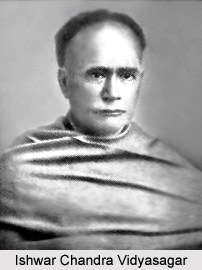 Ishwar Chandra Vidhyasagar was one of the pillars of Bengal Renaissance. An active social reformer, he was born in Birsingha in Midnapur on September 26, 1820. Widely known as Vidhyasagar, he is known to have championed several social causes. He spent is childhood days in abject poverty. His quest for knowledge helped him excel in various fields and win a number of scholarships. Revolutionary by nature, Vidhyasagar ushered in light in the educational system of Bengal. Poet Michael Madhusudan Dutt in one of his works wrote about him, "The genius and wisdom of an ancient sage, the energy of an Englishman and the heart of a Bengali mother".
Ishwar Chandra Vidhyasagar was one of the pillars of Bengal Renaissance. An active social reformer, he was born in Birsingha in Midnapur on September 26, 1820. Widely known as Vidhyasagar, he is known to have championed several social causes. He spent is childhood days in abject poverty. His quest for knowledge helped him excel in various fields and win a number of scholarships. Revolutionary by nature, Vidhyasagar ushered in light in the educational system of Bengal. Poet Michael Madhusudan Dutt in one of his works wrote about him, "The genius and wisdom of an ancient sage, the energy of an Englishman and the heart of a Bengali mother".
During his graduation he gained mastery in many shastras or disciplines - kavya (poetry), alankar (rhetorics), Vedanta (Vedic literature and anthology), Smriti (philosophy of law), nyaya (logic, science and jurisprudence), and jyotish-vidya (astrology). He bagged prizes and scholarships for best performance. Evaluating his stupendous results in the above courses, the College Committee endowed Ishwar Chandra with the Honorific Title of `Vidyasagar` (Ocean of Knowledge) in 1839 when he became a Law Graduate. Vidyasagar`s greatest legacy is the result of his persistent campaign to better the situation of Indian women, specially in his native Bengal.
Many social reformers, such as, the celestial body of the Brahmo Samaj movement -- Raja Ram Mohan Roy, Keshab Chandra Sen, Debendranath Tagore and Christian missionaries like Alexander Duff, Krishna Mohan Banerjee and Lal Behari Dey, were attempting to reform Indian social practice. Vidyasagar endlessly worked for transformation of orthodox Hindu society from within.
During his tenure as the principal of the famous Sanskrit College, he encouraged scholars to study ancient sacred texts and also interpret them. His study of these texts convinced him that the contaminate status of women in nineteenth century Hindu society was not at all sanctioned by the scriptures. It had more to do with existing power relations in society. The bias in law against female inheritance, wealth and property, and the social prejudice against female autonomy and education, were in his eyes comparatively recent phenomena. He raised his voice fearlessly on behalf of widow re-marriage.
Apart from this another custom of the Kulin Brahmin polygamy allowed elderly men often on the verge of death to marry many teenage girls or even infants. The girls were usually abandoned soon after marriage and left behind in their parental homes, with their parents bearing the entire expense of their upkeep in addition to the financial burden of the wedding and dowry. The children would often be widowed within a few years and thereby condemned to live in abstinence, grief, torture, deprivation and discrimination. They were abstained from eating meat, fish, onions, garlic and (often) sugar and to take part in any social customs. Viewing this evil practice against women Vidhyasagar introduced widow remarriage to uplift the Hindu society.
Ishwar Chandra Vidyasagar`s pioneering work in Bengali prose certainly deserves the very best of appreciation. He mostly devoted his time writing reformist literature and textbooks. Vidyasagar cannot be judged as one of the best pure literary figures of Bengal but his simplification of idiomatic expressions and clarification of the writing style provided the sound base on which latter Bengali writers like Tekchand Thakur, Pyarichand Mitra and Bankim Chandra Chatterjee built their literary superstructures. Vidhyasagar also wrote biographical notes on numerous noteworthy personalities in the history of the world so that the young generation could be inspired by reading the great examples of their endurance, hard work, honesty, patience, perseverance, courage, determination and philosophy of life.
Betaal Panchavinsati - 25 tales of a Betaal (Demon) published in 1847 - a translation from the Sanskrit Kathasaritsagara on King Vikramaditya and his Betaal, is one of the most popular works of Vidyasagar in Bengali prose. Other notable literary contributions by him include
Banglar Itihaas (1848)
Jivancharita (1849)
Shakuntala (1854)
Mahabharata (1860)
Seetar Vanavas (1860)
Bhrantivilaas (1869)
Oti Alpa Hoilo (1873)
Aabaar Oti Alpa Hoilo (1873)
Brajavilaas (1884)
Ratnopariksha (1886)
Besides these he also penned down few social reform monologues such as:
* Bidhobabivah (whether widows should remarry) the first exposure (1855)
* Bidhobabivah - the Second Book (1855)
* Bahubivah - (whether polygamy should be banned) the first exposure (1871)
* Bahubivah - the Second Book (1873)
* Balyabivah (flaws of child marriage)
Vidyasagar is also eminently known for his contribution towards the educational book of "Barnoparichoy." It is the first book of the Bengali alphabet written with an aim to introduce kids to the Bengali alphabetical letters.
Ishwar Chandra Vidyasagar thus, with his outstanding contributions steered a revolution in the society. Blessed with intellect, he was also a man with a big heart so much so that people addressed him as "Dayar Sagar." A prolific writer, academician and scholar, he earned respect and love from all the sections of the society. After his death in 1891 Rabindranath Tagore wrote about him, "One wonders how God, in the process of producing forty million Bengalis, produced a man!"




















